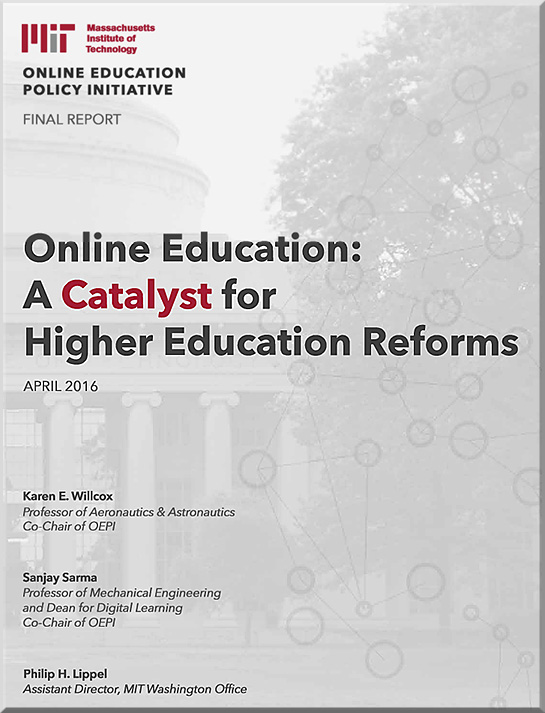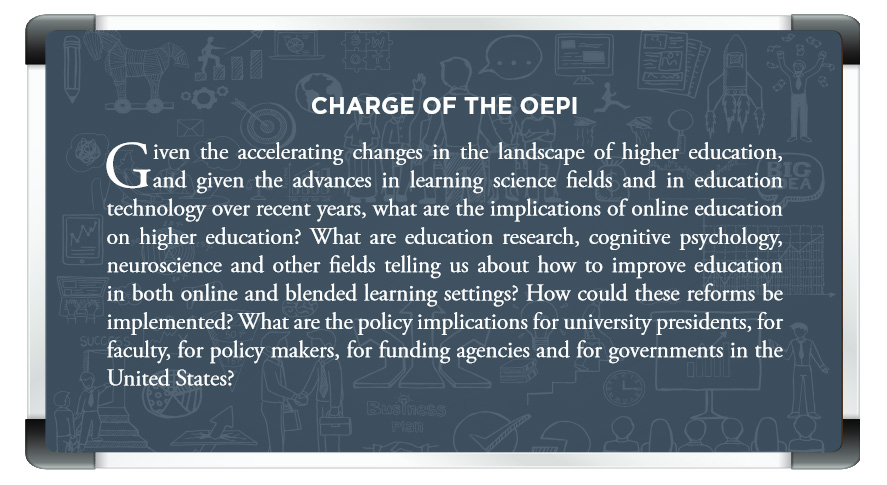The final report of Massachusetts Institute of Technology’s Online Education Policy Initiative presents findings from discussions among the members of the Institute-wide initiative supported by advice from the advisory group. The report reflects comments and responses received from many sources, including education experts, government education officials, and representatives of university organizations.
Our findings target four areas: interdisciplinary collaboration, online educational technologies, the profession of the learning engineer, and institutional and organizational change. Focused attention in these areas could significantly advance our understanding of the opportunities and challenges in transforming education.
Recommendation 1:
Increase Interdisciplinary Collaboration Across Fields of Research in Higher Education, Using an Integrated Research Agenda
Recommendation 2:
Promote Online as an Important Facilitator in Higher Education
Recommendation 3:
Support the Expanding Profession of the “Learning Engineer”
Recommendation 4:
Foster Institutional and Organizational Change in Higher Education to Implement These Reforms
Also see:
MIT releases online education policy initiative report — from news.mit.edu by Jessica Fujimori, April 1, 2016
New report draws on diverse fields to reflect on digital learning.
Excerpts:
A new MIT report on online education policy draws on diverse fields, from socioeconomics to cognitive science, to analyze the current state of higher education and consider how advances in learning science and online technology might shape its future.
…
Titled “Online Education: A Catalyst for Higher Education Reform,” the report presents four overarching recommendations, stressing the importance of interdisciplinary collaboration, integration between online and traditional learning, a skilled workforce specializing in digital learning design, and high-level institutional and organizational change.
…
“There’s so much going on in online education, and it’s moving so quickly, that it’s important to take time to reflect,” says Eric Klopfer, a key participant in the initiative, who is a professor of education and directs the MIT Scheller Teacher Education Program. “One of the goals of the report is to try to help frame the discussion and to pull together some of the pieces of the conversation that are taking place in different arenas but are not necessarily considered in an integrated way,” Willcox says.
“We believe that there is a new category of professionals emerging from all this,” Sarma says. “We use the term ‘learning engineer,’ but maybe it’s going to be some other term — who knows?”
These “learning engineers” would have expertise in a discipline as well as in learning science and educational technologies, and would integrate knowledge across fields to design and optimize learning experiences.
“It’s important that this cadre of professionals get recognized as a valuable profession and provided with opportunities for advancement,” Willcox says. “Without people like this, we’re not going to make a transformation in education.”
Finally, the report recommends mechanisms to stimulate high-level institutional and organizational change to support the transformation of the industry, such as nurturing change agents and role models, and forming thinking communities to evaluate reform options.
“Policy makers and decision makers at institutions need to be proactive in thinking about this,” says Willcox. “There’s a lot to be learned by looking at industries that have seen this kind of transformation, particularly transformations brought on by digital technologies.”










